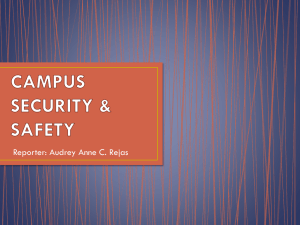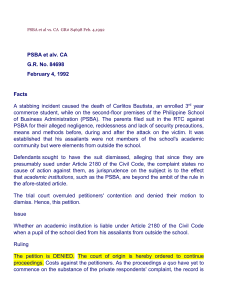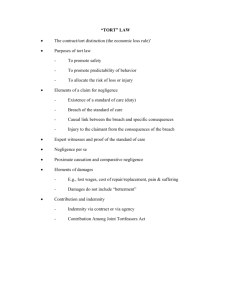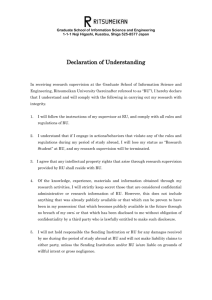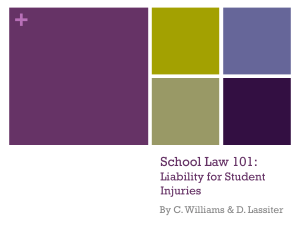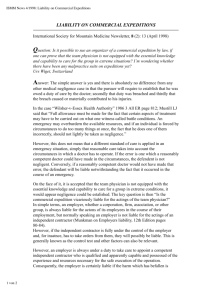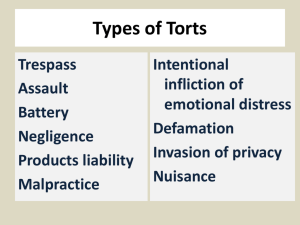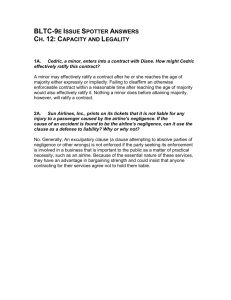Campus Security & Safety
advertisement
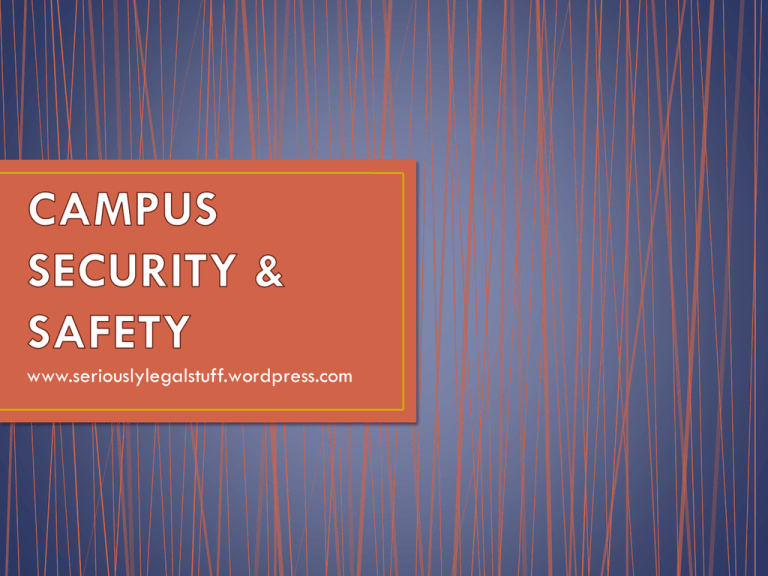
www.seriouslylegalstuff.wordpress.com • • • • School Liability for Torts Legal Requirements to Avoid Liability Concept of Parental Authority & Responsibility Best Practices & Red Flags • Tort Law, concerns civil wrongs and addresses the duty, breach and injury sustained to one individual as a result of another’s conduct. • An unlawful violation of private right, not created by contract, and which gives rise to an action for damages. • Torts such as assault, battery, libel, slander, defamation, false arrest, malicious prosecution and invasion of privacy require proof of intent or willfulness; whereas simple negligence, as an unintentional tort, does not require such proof of intent or willfulness. • Defendants in tort cases can either be natural or artificial being. Corporations are civilly liable in the same manner as natural persons. • Any person who has been injured by reason of a tortious conduct can sue the tortfeasor. • The primary purpose of a tort action is to provide compensation to a person who was injured by the tortious conduct of the defendant. • Preventive remedy is available in some cases. Art. 2180 (Civil Code) The obligation imposed by article 2176 is demandable not only for one’s own acts or omissions, but also for those of persons for whom one is responsible. xxx xxx xxx En locoArticle parentisteachers become the Employers shall be 2176 liable for the damages caused by their (Philippine Civil Code) employees and household helpers acting within the of in “Whoever, by act or omission causes damage another, surrogate parents of the students ortoscope pupils their tasks,oreven though the thereassigned being fault negligence, is former obligedare to not payengaged for the in schools (no limit of age) business or industry. damage done. Such fault or negligence, if there is no prexxx xxx xxxand existing contractual relations between the parties, called It is based on Article 2180 Articleis 2176 Lastly, teachers or heads of establishments of arts and trades a of quasi-delict and is governed byPhilippines. the provisions of this the Civil Code of the shall be liable for damages caused by their pupils and students Chapter.” or apprentices, so long as they remain in their custody. The responsibility treated of in this article shall cease when the persons herein mentioned prove that they observed all the diligence of a good father of a family to prevent damage. 1. Liability by teachers, school administrators and educational institutions arising from negligence 2. Liability by teachers, school administrators and schools for injuries caused by persons in their custody or employment arising from negligence 3. Liability by teachers and school administrators resulting to reckless imprudence due to gross or inexcusable lack of precaution 4. Subsidiary liability by employers, teachers and other persons for crimes committed by their pupils, workmen, apprentices, employees or servants in the discharge of their duties 5. Liability by educational institutions for breach of contract in ensuring that adequate steps are taken to protect students’ life and limb. • Negligence is not necessarily implied whenever someone is injured. The questions to be considered are: 1. whether the2176 injury is(Philippine foreseeableCivil Code) Article “Whoever, by itact or preventable omission causes damage 2. whether was if the persontotoanother, whom there negligence being fault isorattributed negligence, is obliged to the paytime for the was present at of the damage done. Such fault or negligence, if there is no preinjury. existing contractual relations between the parties, is called a quasi-delict and is governed by the provisions of this Chapter.” • Q: Aside from the teacher and head of the school, can the school itself be made liable? • A: In general, the liability of the teacher does not extend to the school. • Principle of Vicarious Liability: • U.S- negligence of the employee is conclusively the negligence of the employer • Philippines- employer is not liable for the negligence of the employee, students or apprentice • Q: May a teacher escape liability for outings and activities held outside the school but authorized by the school? • A: Art 218 of the Family Code states that “authority and responsibility shall apply to all authorized activities whether inside or outside the premises of the school, entity or institution.” • St. Francis School’s Case • St. Mary’s Case • Art. 2180 of the Civil Code, when injury is “Art. 2180 (Civil Code). The obligation imposed by article caused by the negligence of an employee 2176 is demandable not only for one’s own acts or within thebutscope of those their of assigned there omissions, also for persons tasks, for whom one is may rise an assumption that there was also a responsible. negligence on the partx of xx the employer either in Thethe responsibility treated of in this article cease when selection of the employee, or inshall supervision theover person that they observed all himherein aftermentioned selection,proved or both. the diligence of a good father of a family to prevent damage.” • This is due to gross or inexusable lack of precaution in doing or failing to do an act resulting in material damage to another. • Teachers and school administrators may also be held criminally liable for imprudence (negligence) should they be found guilty of inexcusable lack of precaution in doing or failing to do an act which results in material damage to another, taking into consideration their employment and occupation, intelligence, physical condition and other circumstances regarding persons, time and place in determining the degree of care which is required in each particular situation. Liability will be based on criminal negligence (culpa criminal) under Article 365 of the Revised Penal Code. • As long as students are in attendance at school, including recess time, class time, etc., teachers should exercise andCode) supervisory “Art.protective 2180. (Civil custody. The law schools are liable Lastly, teachers or states heads that of establishments of arts as trades long asshall the student is under the control and by and be liable for damages caused influence thestudents school authorities at thesotime their pupils of and or apprentices, longofas the occurrence of the in injury. they remain their custody.” • In case the party causing the damage or injury to students are not members of the educational community, educational institutions may still become liable for breach of contractual obligation of providing students with an atmosphere that promotes or assists in attaining its primary undertaking of imparting knowledge. Hence, the school must ensure that adequate steps are taken to maintain peace and order within its campus premises and prevent its breakdown. • Q: Will the school be held liable for the death of a student inside the school’s premises caused by outside assailants? 1. The school must take appropriate precautions to prevent injury through care in enforcing discipline and observance of school rules and regulations upon students. 2. The school must impose sanctions, guidelines and prohibitions upon teachers and staff. 3. The teacher must prove that due diligence was observed in all things. As to the kind of due diligence, the last paragraph of Art 2180 is clear – “The persons must prove that they have observed all the diligence of a good father of a family to prevent damage”. • Q: Can a teacher or school escape responsibility by asking parents to file a waiver during field trips and outings? • A: This issue is closely related to liabilities outside school and Art 218 is clear that “authority and responsibility shall apply to all authorized activities whether inside or outside the premises of the school, entity or institution.” Acc. To the Family Code and Civil Code of the Philippines Article 218 (Family Code) The school, its administrators and teachers, or the individual, entity or institution engaged in child care shall have special parental authority and responsibility over the minor child while under their supervision, instruction or custody. Authority and responsibility shall apply to all authorized activities whether inside or outside the premises of the school, entity or institution. Article 219 (Family Code) Those given the authority and responsibility under the preceding Article shall be principally and solidarily liable for damages caused by the acts or omissions of the unemancipated minor. The parents, judicial guardians or the persons exercising substitute parental authority over said minor shall be subsidiariliy liable. The respective liabilities of those referred to in the preceding paragraph shall not apply if it is proved that they exercised proper diligence required under the particular circumstances. All other cases not covered by this and the preceding article shall be governed by the provisions of the Civil Code on quasi-delicts. 1 Article 221 (Family Code) Parents and other persons exercising parental authority shall be civilly liable for the injuries and damages caused by the acts or omissions of their unemancipated children living in their company and under their parental authority subject to the appropriate defenses provided by law Article 2176 (Civil Code) Whoever by act or omission causes damage to another, there being fault or negligence, is obliged to pay for the damage done. Such fault or negligence, if there is no pre-existing contractual relation between the parties, is called a quasi-delict and is governed by the provisions of this chapter. 1 Article 2180 (Civil Code) The obligation imposed by article 2176 is demandable not only for one’s own acts or omissions, but also for those of persons for whom one is responsible. xxx xxx xxx Employers shall be liable for the damages caused by their employees and household helpers acting within the scope of their assigned tasks, even though the former are not engaged in business or industry. xxx xxx xxx Lastly, teachers or heads of establishments of arts and trades shall be liable for damages caused by their pupils and students or apprentices, so long as they remain in their custody. The responsibility treated of in this article shall cease when the persons herein mentioned prove that they observed all the diligence of a good father of a family to prevent damage. 12 Clearly, a teacher or school personnel required to exercise special parental responsibility (in loco parentis) but who fails to observe all the diligence of a good father of a family in the custody and care of the pupils and students, shall be held liable for gross neglect of duty. • Sarmiento U.P. (2006) Students’ Rights & Wrongs: A Comprehensive Sourcebook on Legal Rights of Students and the Limitations. Philippines. • Bauzon, P.T. (2012) Handbook in Legal Bases of Education. 2nd Ed. Mandaluyong City: National Bookstore • Civil Code of the Philippines with Republic Act No. 386 As Amended. 6th Ed. Manila: Central Book Supply, Inc. • The Family Code of the Philippines. Manila, Philippines • http://lexetjurispart1.blogspot.com/
